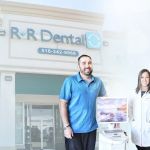Best Practices for Caring for Baby Teeth
As a parent, one of the most important responsibilities I’ve come to appreciate is caring for my child’s teeth. It may seem like baby teeth are temporary and not as significant as permanent teeth, but proper care for those little pearly whites is crucial for both immediate and long-term oral health. Over the years, I’ve learned a lot about baby teeth and how essential it is to start good oral hygiene practices early. In this article, I’ll share what I’ve learned about caring for baby teeth, including tips for brushing, preventing cavities, and establishing a solid dental routine.
1. Why Caring for Baby Teeth Matters
At first, I didn’t realize how important baby teeth really are. After all, they’ll eventually fall out, right? However, I quickly learned that baby teeth play a critical role in a child’s overall health. They help with speech development, allow your child to chew food properly, and maintain the space for adult teeth to grow in correctly. If baby teeth decay or are lost too early, it can affect the alignment of the permanent teeth and potentially lead to further dental issues down the line.
What I found most surprising was how much baby teeth influence a child’s confidence as they grow. As they start to smile, show off those little teeth, and learn to speak, healthy baby teeth make a huge difference in their development. Maintaining proper care from the very beginning sets the stage for good oral habits in the future, which is why I started early with my own child’s dental care routine.
2. The Right Time to Start Brushing Baby Teeth
One of the first things I learned as a new parent was that brushing should start even before the first tooth erupts. Once a baby is born, I used a clean, soft cloth to wipe the baby’s gums after feedings to get rid of any bacteria. This was a simple habit to incorporate, but it helped establish the importance of cleanliness from the very start.
Once the first tooth appears, which usually happens around 6 months of age, I began brushing with a tiny, soft-bristled toothbrush. I used a small smear of fluoride-free toothpaste, as recommended by pediatric dentists. This is essential because even baby teeth can develop cavities if sugar from milk or food is left on the teeth for too long. By starting early, I set a routine that would eventually include all the necessary steps for a healthy mouth.
3. Tips for Brushing Baby Teeth
As my child’s teeth started to grow, I wanted to ensure I was brushing them correctly. Here are a few tips that worked well for me:
3.1. Use a Soft-Bristled Toothbrush
When my child’s first tooth appeared, I switched from using a cloth to a soft-bristled toothbrush. A brush with soft bristles is gentle on tiny gums and teeth, reducing the risk of discomfort or damage. I also chose a toothbrush with a small head that could easily reach the back teeth as they started to come in.
3.2. Use a Tiny Amount of Toothpaste
At first, I used a tiny, pea-sized amount of fluoride-free toothpaste, as recommended by my pediatric dentist. As my child got older, I gradually switched to fluoride toothpaste, but I continued to only use a small amount. It’s important not to use too much toothpaste at this stage because little ones are still learning how to spit out the toothpaste, and swallowing too much fluoride can cause issues with the development of adult teeth.
3.3. Brush Twice a Day
Just like adults, babies need to brush their teeth twice a day—once in the morning and once before bed. I made it a point to brush after breakfast and right before my child went to bed. This helps to remove plaque and food particles that can contribute to cavities. It also helped my child understand that brushing teeth is an essential part of the daily routine, just like bathing and eating.
3.4. Make It Fun
To make tooth brushing enjoyable, I introduced fun brushing songs and made it a game. I even bought toothbrushes with my child’s favorite characters on them, which made the process more exciting. The goal was to make brushing something my child looked forward to, rather than a chore, so they’d be more likely to continue the habit as they got older.
4. Preventing Cavities in Baby Teeth
Preventing cavities in baby teeth is one of the most important aspects of early dental care. Over time, I learned that the best way to avoid cavities is to reduce the sugar and bacteria that can cause tooth decay. Here are a few steps I took to prevent cavities:
4.1. Avoid Sugary Drinks
One of the biggest contributors to cavities in babies and toddlers is sugary drinks, especially juice. At first, I was cautious with how much juice I gave my child. I always watered it down and offered it in moderation, but I quickly switched to water as my child’s main drink. Milk is also a sugar source, so I always made sure to clean my child’s teeth after feedings.
4.2. Don't Let Baby Sleep with a Bottle
It’s tempting to let babies drift off to sleep with a bottle, but I learned that this can lead to “bottle tooth decay.” When milk or juice sits on baby teeth overnight, it creates an environment for cavities to develop. I made sure to clean my baby’s teeth before bedtime and never allowed my child to sleep with a bottle. This small change had a significant impact on their oral health.
4.3. Regular Dental Checkups
After my child’s first tooth appeared, I made it a priority to schedule their first dentist appointment by their first birthday, as recommended by pediatric dentists. Regular checkups allow the dentist to catch any potential issues early, such as cavities, gum infections, or misalignments. Early dental visits also help children get comfortable with the dentist, making future visits easier.
5. Transitioning to Brushing on Their Own
As my child grew older, I gradually transitioned them to brushing their own teeth. At around age 3, I started letting my child brush their teeth with my supervision. At this stage, I also introduced a fluoride toothpaste and began teaching my child to spit out the toothpaste after brushing. By the time they were around 5 or 6 years old, they were able to brush on their own, though I still remind them to brush for two minutes and reach all the surfaces of their teeth.
6. Conclusion: Establishing Healthy Habits Early
Establishing a solid dental care routine for baby teeth is essential for promoting a lifetime of good oral health. By starting early with proper brushing techniques, avoiding sugary foods, and maintaining regular dental visits, I’ve set my child up for success when it comes to their dental health. Baby teeth may be temporary, but the habits we form around them last a lifetime. I can’t stress enough how important it is to begin dental care as early as possible—it’s one of the most valuable investments you can make in your child’s health.
If you’re looking for more dental tips and resources, visit Dentistry Toothtruth for expert advice and support to guide you through your child’s dental health journey.







 Princeton Dental Dr. Kevin F. Blair, DDS5.0 (3 review)
Princeton Dental Dr. Kevin F. Blair, DDS5.0 (3 review) Rapid City Dental Clinic4.0 (90 review)
Rapid City Dental Clinic4.0 (90 review) Cash Family Orthodontics4.0 (141 review)
Cash Family Orthodontics4.0 (141 review) R+R Dental4.0 (529 review)
R+R Dental4.0 (529 review) 65 Broadway Dental4.0 (516 review)
65 Broadway Dental4.0 (516 review) Ovation Orthodontics4.0 (175 review)
Ovation Orthodontics4.0 (175 review) The Importance of Oral Health Education During Pregnancy for a Healthy Pregnancy
The Importance of Oral Health Education During Pregnancy for a Healthy Pregnancy Best Tips for Brushing Your Teeth Properly for Healthy Gums: Essential Techniques for Oral Health
Best Tips for Brushing Your Teeth Properly for Healthy Gums: Essential Techniques for Oral Health Why Skipping Dental Checkups Can Lead to Bigger Oral Health Problems
Why Skipping Dental Checkups Can Lead to Bigger Oral Health Problems Advantages of Porcelain Dental Restorations
Advantages of Porcelain Dental Restorations How Can Diabetes Cause Tooth and Gum Problems? Preventing and Managing Oral Health Issues
How Can Diabetes Cause Tooth and Gum Problems? Preventing and Managing Oral Health Issues Healthy Habits for Promoting Good Oral Health and Hygiene: Tips for a Healthy Smile
Healthy Habits for Promoting Good Oral Health and Hygiene: Tips for a Healthy Smile